Good basic skin care is sensible care of the skin. It can be accomplished without expensive products. The basic ingredients to start you on maintenance of your skin consists of gentle soap and water, moisturizer, sunscreen and some basic knowledge of when to see your doctor if you think there are any problems with your skin.
The quest to look good is not something recent. Cosmetics used to enhance one’s looks or to camouflage one’s shortcomings have been around since the early ages. Our skin, after years of exposure to the ravages of the environment, depending on the type and extent of exposure, can look like a battlefield. With the increasing pressure of the media that one has to have beautiful skin to look good, it is little wonder that the cosmetic industry is one of the largest and most rapidly growing ones.
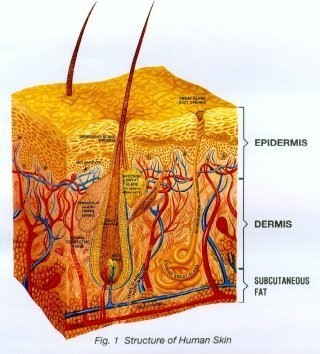
The skin is the largest organ of the body. It is divided into 3 main layers, namely
The epidermis can be divided into several layers. The outermost layer is composed of a relatively thin, but rough, protective top layer of dead skin cells, the stratum corneum. The remainder of the epidermis is made up of cells called keratinocytes as well as melanocytes, which are pigment cells responsible for skin pigmentation.
Within the dermis are found supporting and elastic tissue, nerves, oil glands, sweat glands, blood vessels and hair roots.
The subcutaneous fat is composed of fat cells, which form a cushioning layer between the skin and the deeper muscles and also serve as an energy store.
What does your skin do?
The skin provides several important functions.
- Barrier function – the skin protects the internal structures of our body against injuries, and yet allows the exchange of fluids and gases between the body and the environment.
- Temperature regulation – alteration of the rates of skin blood flow and sweating helps maintain our skin and body temperature.
- Protection against harmful effects of ultraviolet light through our pigment cells.
- Sensory organ – through the specialized nerve endings in the skin, the body is able to perceive various sensations evoked by external agents.
- Metabolism – Vitamin D is produced through the interaction of ultraviolet light on precursors of vitamin D present in our skin.
- Immune function – the skin cells present in the epidermis protect the body against external agents.
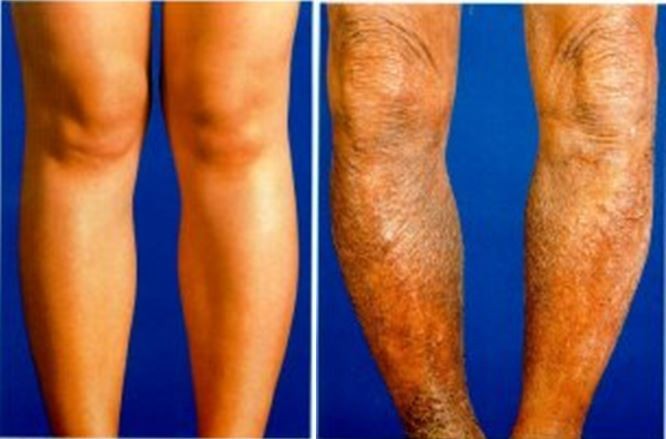
What do cosmetics contain?
Cosmetics may be defined as any substance applied externally to the body to enhance beauty. They are made up of many different chemicals eg. the active ingredient, fragrances, animal, vegetable or synthetic oils/ fats, colouring agents, preservatives and others, some of which are closely guarded “secret ingredients”. Some of the ingredients can cause skin problems on the areas applied while others eg. resins in nail products can cause skin conditions in areas other than the areas applied eg. the face.
What are hypoallergenic products, can they cause skin problems?
Many claims have been made by cosmetic companies. As long as a chemical is used on the skin, there is a potential for skin problems to occur. Many hypoallergenic products do not contain lanolin (which comes from the waxes of wool) and fragrances as it has been found that these two compounds do not uncommonly cause skin problems. However, they must contain preservatives to increase the shelf-life and these can cause allergy.
What are non-comedogenic products?
The term non-comedogen, on a product, means that the manufacturer has tried to eliminate the chemicals that have been known or tested in a laboratory model to cause comedones (whiteheads). Although in theory it sounds good the substances are tested on a rabbit ear model and unless our skin behaves like a rabbit’s, the results may not be totally predictable.
What are the common substances in cosmetics that cause skin problems?
Before we answer that question, we have to know that there are normally 2 types of reactions that one may encounter with the use of cosmetics. One is due to the irritant nature of the product. This depends on the chemicals used, how often and under what condition it is used and the condition of the person’s skin. Another reaction is due to an allergy to the compound and this is not as common. This depends on how allergenic the compound is and the ability of the person to develop the allergy.
The common substances that cause irritation on the skin are volatile chemicals like alcohols., chemicals with excessively high or low pH or abrasive substances like facial scrubs. The common allergens, on the other hand, are lanolin or its derivatives, perfume chemicals, preservatives and sunscreen substances.
Basic Skin Care Routine
Soaps and Cleansers
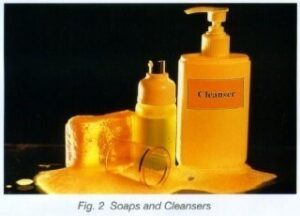 Soap is simply any skin cleanser made from the salts of animal or vegetable fats. Cleaning with soap and water removes most environmental and natural skin surface substances, such as dirt, cosmetics, oils, bacteria, sweat and dead skin cells.
Soap is simply any skin cleanser made from the salts of animal or vegetable fats. Cleaning with soap and water removes most environmental and natural skin surface substances, such as dirt, cosmetics, oils, bacteria, sweat and dead skin cells.
For dry sensitive skin, these are suitable:
- Superfatted soaps, which contain an extra amount of oils and fats to reduce the tendency of the soap to dry out your skin,
- “Soapless” soaps, which contain synthetic soaps made from petroleum derivatives
- Lipid cleansers, which include emulsions of acetyl alcohol, emulsifying ointment, aqueous creams or bath oils. These leave a film to moisturize the skin.
Soaps to avoid are strong medicated soaps, abrasive soaps as well as herbal soaps, especially on the face.
Even mild soaps or cleansers can still be drying to your skin. You can minimize a soap’s tendency to be drying by being gentle with cleaning and taking care not to scrub excessively. Often water alone is adequate for skin cleansing.
Moisturizers – When to use them?
Naturally moist, smooth and supple skin results from sufficient amounts of water, oil and special chemicals called natural moisturizing factors. Under ordinary circumstances, 95 per cent of each of our cells is made up of water. It is the water content of your skin cells that determines how moist or supple your skin is.
Avoiding dry skin is therefore one of the key elements in good basic skin care. Dry skin can also make you more prone to scaling, cracking, irritation, eczema and infections. Factors that cause or aggravate dry skin include harsh soaps, excessive bathing, low humidity and hereditary factors. Dry skin cannot be treated by drinking extra water or eating oily foods.
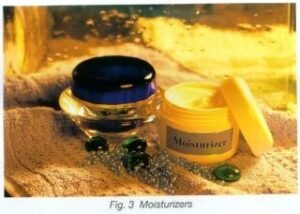 A moisturizer or emollient can make your skin more supple and promote smoothness. Moisturizers are used to prevent water loss from the skin through evaporation and holding on to water. Moisturizers cannot restore youth, rejuvenate your skin or dissolve your wrinkles. They should be applied on a daily basis, especially after your bath.
A moisturizer or emollient can make your skin more supple and promote smoothness. Moisturizers are used to prevent water loss from the skin through evaporation and holding on to water. Moisturizers cannot restore youth, rejuvenate your skin or dissolve your wrinkles. They should be applied on a daily basis, especially after your bath.
Inexpensive, basic moisturizers generally do as good a job as expensive ones. Be sceptical of wild promises which any product claims; many such claims are not substantiated by any scientific evidence.
Sun protection – How useful is it?
The sun is responsible for premature ageing. It hastens the wrinkling and tanning of your skin, as well as causes the appearance of blotchy brownish discolouration. The ultraviolet radiation in sunlight is responsible for suntans, sunburns, premature ageing (wrinkles and pigmentation) and some types of skin cancers.
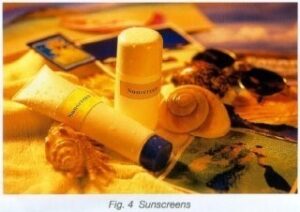 It is important to avoid excessive sun exposure. The sun’s rays are strongest between the hours of 10 am to 3 pm. Clothing also has some bearing on the effects of sun exposure. Cotton fabrics provide superior protection from sunlight and tightly woven fabrics afford better protection than loose weaves.
It is important to avoid excessive sun exposure. The sun’s rays are strongest between the hours of 10 am to 3 pm. Clothing also has some bearing on the effects of sun exposure. Cotton fabrics provide superior protection from sunlight and tightly woven fabrics afford better protection than loose weaves.
In addition to common sense approaches to sun avoidance, the routine use of sunscreen is an important part of basic skin care maintenance. There are basically two types of sunscreens:-
- Physical sunscreens contain opaque, physical barriers such as titanium dioxide and zinc oxide which reflect the light energy,
- Chemical sunscreens, which contain chemical ingredients to absorb the ultraviolet rays.
The SPF (Sun Protection Factor) tells you the degree of protection the sunscreen offers. Generally, an SPF of 20 or more is advised.
As a guide, most sunscreens should be applied at least twenty to thirty minutes before going out. You should re-apply after prolonged swimming or excessive perspiration.
When to seek professional advice?
Good basic skin care also means that you recognize problems that arise in the skin and seek professional advice early. If you develop a rash, itch, pigmentation problems or skin growths, see your family doctor or a dermatologist. Do not attempt self-cures. Specific problems should be treated by a professional.



